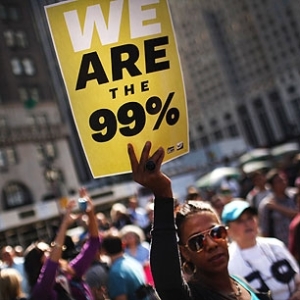 This is not — really — a joke. So Mitt Romney walks into a the offices of a GOP phone bank. To rally the troops, you see. The place is crowded with volunteers furiously dialing up voters to prevent what appears to be the certain overturn of the Wisconsin-like anti-collective bargaining legislation rammed into law by Ohio’s new and now deeply unpopular (54% disapproval) governor.
This is not — really — a joke. So Mitt Romney walks into a the offices of a GOP phone bank. To rally the troops, you see. The place is crowded with volunteers furiously dialing up voters to prevent what appears to be the certain overturn of the Wisconsin-like anti-collective bargaining legislation rammed into law by Ohio’s new and now deeply unpopular (54% disapproval) governor.
The standard move in these situations is for the candidate to make — at least one — call himself. For the cameras. “Hi, Mrs. Lebowski? This is Mitt Romney. No, really, Mitt Romney. Yes, yes, ‘the guy who looks like he turned your dad down for a loan’, that Mitt Romney’. But no. Not only doesn’t Romney dial-up an Ohio citizen and urge them to support their Republican governor and his aggressive, 21st century union-busting, anti-middle class Republican legislation … Romney doesn’t even endorse what everyone in the room is working so hard to save.
From the CNN story:
Romney expressed generic support for Kasich’s efforts to curtail union rights, but he would not say whether he supports or opposes the specific measures.
“I am not speaking about the particular ballot issues,” Romney said, only after repeated questions from reporters. “Those are up to the people of Ohio. But I certainly support the efforts of the governor to reign in the scale of government. I am not terribly familiar with the two ballot initiatives. But I am certainly supportive of the Republican Party’s efforts here.”
If you’re like me you say, “Well, that’s classic Romney. The guy gives shameless, naked pandering another even worse name. He’s been on five sides of every issue you can think of.” Democrats love the guy for precisely this kind of completely craven and predictable waffling. In addition to the deliciously ripe story of his career as essentially a corporate raider, many times eviscerating American companies and requiring hundreds of middle-class lay-offs in exchange for his own fast profit, Romney is the kind of competition that manufacturers his own oppo-research and attack ads. And, more to my point here, the modern conservative “intelligentsia”, a crowd heavily self-invested in rigid-sounding, ersatz-populist dogmas and total victory-without-compromise is well aware of it. Hence his 25% polling … behind … Herman Cain, a guy who hasn’t even bothered to assemble a full function campaign apparatus.
And ladies and gentlemen, Mitt Romney is where he is today, among the leaders for the Republican nomination, because he is regarded as “the most electable of those running”. Of all of the cartoonish characters on the GOP candidate menu, Romney is the default candidate because he seems the guy with the best chance of beating Barack Obama …. which could still happen. Even the heretofore commonly accepted icons of conservative thought — people like George Will and John Podhoretz — have gone public with very serious doubts about Romney and the rest of the cast.
Said Will Sunday: “Romney, supposedly the Republican most electable next November, is a recidivist reviser of his principles who is not only becoming less electable; he might damage GOP chances of capturing the Senate. Republican successes down the ticket will depend on the energies of the Tea Party and other conservatives, who will be deflated by a nominee whose blurry profile in caution communicates only calculated trimming.”
Earlier last week Podhoretz, in Rupert Murdoch’s New York Post wrote of the entire GOP field, “Memo to the Republican field: You’re running for president. Of the United States. Of America. Start acting like it. Stop proposing nonsense tax plans that won’t work. Stop making ridiculous attention-getting ads that might be minimally acceptable if you were running for county supervisor in Oklahoma. Stop saying you’re going to build a US-Mexico border fence you know perfectly well you’re not going to build. Give the GOP electorate and the American people some credit. This country is in terrible shape. They know it. You know it. They want solutions. You’re providing comedy.”
Podhoretz may have been referring less to Romney and more to completely bogus, ego-acts like we’ve seen from Donald Trump, Sarah Palin, Newt Gingrich, Michele Bachmann and Herman Cain, “candidates” in name only with, in many cases, not even the pretense of hiring staff and operating a legitimate campaign, but Mitt comes awfully close to comedy.
But, without ascribing any undo legitimacy to the Tea Party’s intellectual foundation, what fascinates me most at this moment is watching to see how that crowd, so pleased with their moral/intellectual purity, and the more mainstream Republican faction that has enabled the obstructionist mayhem the Tea Party has leveled on this economy rationalizes Mitt Romney as their standard-bearer. True, he is not Obama. But for every time Romney has said something supportive of the Tea Party’s take-no-prisoners jihad against common sense and social decency he is also on record saying precisely the opposite.
Were the Tea Party truly rooted in the “principles” they’re constantly professing to fight to their (and our) death for, Mitt Romney would be an absolute anathema, exactly the untrustworthy, self-aggrandizing empty suit they couldn’t possibly trust in good conscience.
More to the point, true Tea Party revolutionaries would have no honorable course of action other than to launch a third party candidacy behind a bona fide flag bearing warrior spirit like … Ron Paul or Bachmann?
As I’ve said before, the Tea Party movement is rooted far more in long-standing cultural and social issue grudges than middle-class economic “populism”. But that makes support for an on-again-off-again whenever-opportune social liberal like Mitt Romney all the more preposterous … and comical.











